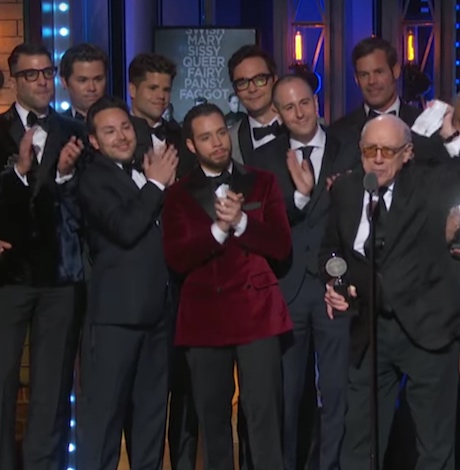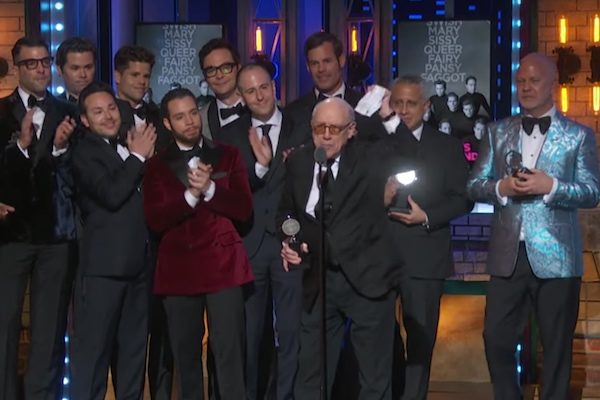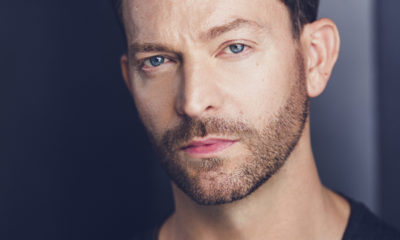Arts & Entertainment
Tony Awards 2019: ‘Boys in the Band,’ ‘The Cher Show’ pick up wins
‘Hadestown’ leads with triumphs for eight categories


“The Boys in the Band” received the award for Best Revival of a Play at the 73rd Annual Tony Awards at Radio City Music Hall on Sunday making 83-year-old playwright Mart Crowley the oldest playwright to win the award.
The play tells the story of a group of gay friends who gather together to celebrate a friend’s birthday in pre-Stonewall New York City. It opened off-Broadway in 1968. For the play’s 50th anniversary, the production was revived in 2018 with co-producer Ryan Murphy and director Joe Mantello.
The openly gay revival cast included Matt Bomer, Jim Parsons, Zachary Quinto, Andrew Rannells, Charlie Carver, Robin de Jesús, Brian Hutchison, Tuc Watkins and Michael Benjamin Washington.
Murphy is also planning a film adaptation for Netflix featuring the Broadway cast.
Crowley dedicated the award to the original cast in his acceptance speech.
“I’d like to dedicate the award to the original cast of nine brave men, who did not listen to their agents when they were told that their careers would be finished if they did this play,” Crowley said. “They did it, and here I am.”
“Hadestown” was the big winner of the evening, which was hosted by James Corden, coming in with eight wins.
Bisexual actress Ali Stoker, also known for her work on “The Glee Project,” won Best Featured Actress in a Musical for portraying Ado Annie in the “Oklahoma!” revival.
Stephanie J. Block won Best Actress in a Musical for playing Cher in “The Cher Show.” Legendary costume designer Bob Mackie and longtime Cher collaborator also won Best Costume Design in a Musical for “The Cher Show.” Cher celebrated the multiple wins with an emotional tweet.
I CANNOT STOP JUMPING, CRYING,LAUGHING,….I FEEL LIKE I WON AN AWARD‼️
— Cher (@cher) June 10, 2019
NOT EVEN SURE IF I CAN USE EMOJIS.
STEPHANIE,BESIDES ME…YOU
ARE THE“ BEST ME”?
BOB I LOVED YOU THE MOMENT I SAW YOU❤️
BEST ACTRESS IN MUSICAL =
STEPHANIE J BLOCK
BEST COSTUME DESIGN
BOB MACKIE pic.twitter.com/Lsha8FhKQX
Gay winners continued to dominate the night with Robert Horn winning Best Book of a Musical for “Tootsie,” Sergio Trujillo winning Best Choreography for The Temptations musical “Ain’t Too Proud” and André DeShields winning Best Featured Actor in a Musical for Broadway hit “Hadestown.”
The Tonys included some starring looks including Billy Porter who rocked the rainbow-backdropped red carpet, which honored World Pride, with a Celestino Couture created from the velvet curtains of “Kinky Boots.” Porter won a Tony Award for starring in the musical in 2013. The outfit is reportedly meant to resemble women’s reproductive organs in a stand for abortion rights.
“The Prom” cast also performed and included the kiss that made history at the Macy’s Thanksgiving Day Parade for being the first same-sex kiss to air on the televised parade.
Check out the list of winners below.
Best Play
“Choir Boy”
“Gary: A Sequel to Titus Andronicus”
“Ink”
“The Ferryman”
“What the Constitution Means to Me”
Best Musical
“Ain’t Too Proud”
“Beetlejuice”
“Hadestown”
“The Prom”
“Tootsie”
Best Revival of a Play
“All My Sons”
“Burn This”
“The Boys in the Band”
“The Waverly Gallery”
“Torch Song”
Best Revival of a Musical
Kiss Me, Kate
“Oklahoma!”
Best Book of a Musical
“Ain’t Too Proud” by Dominique Morisseau
“Beetlejuice” by Scott Brown and Anthony King
“Hadestown” by Anaïs Mitchell
“The Prom” by Bob Martin and Chad Beguelin
“Tootsie” by Robert Horn
Best Original Score (Music and/or Lyrics) Written for the Theatre
“Be More Chill” by Joe Iconis
“Beetlejuice” by Eddie Perfect
“Hadestown” by Anaïs Mitchell
“The Prom” by Matthew Sklar and Chad Beguelin
“To Kill a Mockingbird” by Adam Guettel
“Tootsie” by David Yazbek
Best Performance by an Actor in a Leading Role in a Play
Paddy Considine, “The Ferryman”
Bryan Cranston, “Network”
Jeff Daniels, “To Kill a Mockingbird”
Adam Driver, “Burn This”
Jeremy Pope, “Choir Boy”
Best Performance by an Actress in a Leading Role in a Play
Annette Bening, “All My Sons”
Laura Donnelly, “The Ferryman”
Elaine May, “The Waverly Gallery”
Laurie Metcalf, “Hillary and Clinton”
Janet McTeer, “Bernhardt/Hamlet”
Heidi Schreck, “What the Constitution Means to Me”
Best Performance by an Actor in a Leading Role in a Musical
Brooks Ashmanskas, “The Prom”
Derrick Baskin, “Ain’t Too Proud”
Alex Brightman, “Beetlejuice”
Damon Daunno, “Oklahoma!”
Santino Fontana, “Tootsie”
Best Performance by an Actress in a Leading Role in a Musical
Stephanie J. Block, “The Cher Show”
Caitlin Kinnunen, “The Prom”
Beth Leavel, “The Prom”
Eva Noblezada, “Hadestown”
Kelli O’Hara, “Kiss Me, Kate”
Best Performance by an Actor in a Featured Role in a Play
Bertie Carvel, “Ink”
Robin De Jesús, “The Boys in the Band”
Gideon Glick, “To Kill a Mockingbird”
Brandon Uranowitz, “Burn This”
Benjamin Walker, “All My Sons”
Best Performance by an Actress in a Featured Role in a Play
Fionnula Flanagan, “The Ferryman”
Celia Keenan-Bolger, “To Kill a Mockingbird”
Kristine Nielsen, “Gary: A Sequel to Titus Andronicus”
Julie White, “Gary: A Sequel to Titus Andronicus”
Ruth Wilson, “King Lear”
Best Performance by an Actor in a Featured Role in a Musical
André De Shields, “Hadestown”
Andy Grotelueschen, “Tootsie”
Patrick Page, “Hadestown”
Jeremy Pope, “Ain’t Too Proud”
Ephraim Sykes, “Ain’t Too Proud”
Best Performance by an Actress in a Featured Role in a Musical
Lilli Cooper, “Tootsie”
Amber Gray, “Hadestown”
Sarah Stiles, “Tootsie”
Ali Stroker, “Oklahoma!”
Mary Testa, “Oklahoma!”
Best Scenic Design of a Play
Miriam Buether, “To Kill a Mockingbird”
Bunny Christie, “Ink”
Rob Howell, “The Ferryman”
Santo Loquasto, “Gary: A Sequel to Titus Andronicus”
Jan Versweyveld, “Network”
Best Scenic Design of a Musical
Robert Brill and Peter Nigrini, “Ain’t Too Proud”
Peter England, “King Kong”
Rachel Hauck, “Hadestown”
Laura Jellinek, “Oklahoma!”
David Korins, “Beetlejuice”
Best Costume Design of a Play
Rob Howell, “The Ferryman”
Toni-Leslie James, “Bernhardt/Hamlet”
Clint Ramos, “Torch Song”
Ann Roth, “Gary: A Sequel to Titus Andronicus”
Ann Roth, “To Kill a Mockingbird”
Best Costume Design of a Musical
Michael Krass, “Hadestown”
William Ivey Long, “Beetlejuice”
William Ivey Long, “Tootsie”
Bob Mackie, “The Cher Show”
Paul Tazewell, “Ain’t Too Proud”
Best Lighting Design of a Play
Neil Austin, “Ink”
Jules Fisher + Peggy Eisenhauer, “Gary: A Sequel to Titus Andronicus”
Peter Mumford, “The Ferryman”
Jennifer Tipton, “To Kill a Mockingbird”
Jan Versweyveld and Tal Yarden, “Network”
Best Lighting Design of a Musical
Kevin Adams, “The Cher Show”
Howell Binkley, “Ain’t Too Proud”
Bradley King, “Hadestown”
Peter Mumford, “King Kong”
Kenneth Posner and Peter Nigrini, “Beetlejuice”
Best Sound Design of a Play
Adam Cork, “Ink”
Scott Lehrer, “To Kill a Mockingbird”
Fitz Patton, “Choir Boy”
Nick Powell, “The Ferryman”
Eric Sleichim, “Network”
Best Sound Design of a Musical
Peter Hylenski, “Beetlejuice”
Peter Hylenski, “King Kong”
Steve Canyon Kennedy, “Ain’t Too Proud”
Drew Levy, “Oklahoma!”
Nevin Steinberg and Jessica Paz, “Hadestown”
Best Direction of a Play
Rupert Goold, “Ink”
Sam Mendes, “The Ferryman”
Bartlett Sher, “To Kill a Mockingbird”
Ivo van Hove, “Network”
George C. Wolfe, “Gary: A Sequel to Titus Andronicus”
Best Direction of a Musical
Rachel Chavkin, “Hadestown”
Scott Ellis, “Tootsie”
Daniel Fish, “Oklahoma!”
Des McAnuff, “Ain’t Too Proud”
Casey Nicholaw, “The Prom”
Best Choreography
Camille A. Brown, “Choir Boy”
Warren Carlyle, “Kiss Me, Kate”
Denis Jones, “Tootsie”
David Neumann, “Hadestown”
Sergio Trujillo, “Ain’t Too Proud”
Best Orchestrations
Michael Chorney and Todd Sickafoose, “Hadestown”
Simon Hale, “Tootsie”
Larry Hochman, “Kiss Me, Kate”
Daniel Kluger, “Oklahoma!”
Harold Wheeler, “Ain’t Too Proud”
Television
ICYMI: ‘Overcompensating’ a surprisingly sweet queer treat
A sweet, savvy show about breaking free to embrace your true self

Pride month 2025 is now behind us, and while it’s safe to say that this year’s celebrations had a darker edge than usual, it’s also true that they came with a particularly rich bounty of new queer movies and shows to entertain us – so many, in fact, that even if we are facing a lull until the fall another harvest of fresh content, there are still plenty of titles – which, for whatever reason, were off your radar – for you to catch up on in the meantime.
One of the most notable of these – the bingeworthy series “Overcompensating” (now streaming on Amazon Prime) – will most definitely have been ON the radar for the plentiful fans of creator and star Benito Skinner, the actor/comedian who rose to viral fame through his content on platforms like Instagram, YouTube, and TikTok. For anyone else, it might have easily slipped through the cracks.
Created and written by Skinner as a loosely autobiographical “college comedy,” it aims for the kind of raucous, explicitly sexed-up tone one expects from the genre as it centers on Benny (Skinner), newly arrived as a freshman at prestigious Yates University. A former football jock and “golden boy” at his midwestern high school, he’s the picture of idealized youthful masculinity; he’s also deep in the closet, struggling to keep his sexuality hidden and maintain his macho front under the intense scrutiny of the college’s social scene – and under the resentful eye of his older sister Grace (Mary Beth Barone), who has already secured her own place at the top of the pecking order.
In the first episode, Benny’s difficulties are eased when he meets Carmen (Wally Baram), another freshman trying to navigate the politics of college life; a gamer from a home marred by tragedy, she’s an outsider who feels like she’s putting on an act, too, and they click – giving him the convenient “cover” of female companionship while providing them both with much-needed support and encouragement. He’s also befriended by a handsome film major from England (Rish Shah), who has already caught his eye, stirring other kinds of feelings and possibly even reciprocating them. Meanwhile, he’s being courted by the school’s “exclusive secret society” – headed by his sister’s aggressively “alpha” boyfriend Pete (Adam DiMarco) – and trying to stay interested in his studies, despite a growing realization that a career in business doesn’t actually appeal to him all that much.
That’s a lot to juggle for anybody, even an overachiever like Benny – whose “lucky” life so far has largely been the result of playing a role he is finding harder and harder to maintain. As the series goes on through its eight-episode arc, it becomes clear that he’s not the only one who is “keeping up appearances,” and he, along with the other confused and damaged young people in his orbit, begins the painful (but often hilarious) process of evolution that is required in order to become truly oneself.
Directed toward appealing to a younger demographic, “Overcompensating” is the kind of show that requires a few episodes worth of invested time to make an impression that feels like substance. Full of the bawdy farcical antics that go hand in hand with stories about hormonally charged college kids, it’s not above leaning into the formulas and tropes that have always driven these kinds of comedies. At first, while its broadly comedic strokes and frequently explicit sexual hijinks might elicit plenty of chuckles, the show might easily feel tiresome for more mature audiences; there’s a nostalgic fun to it, made even more appealing, somehow, by the “political incorrectness” of its frequently sexist and homophobic humor, but for a while things may feel like an unnecessary attempt to reinvent “Animal House” for the Gen Z crowd.
By the time the season reaches its halfway point, however, things have started to get real. The antics of these horny almost-adults take on a more pointed absurdity, informed by the increasingly tangled web of defensive deceit they weave among themselves – and, as things draw toward a cliffhanger climax, the consequences of maintaining it – until it achieves a sense of empathy toward them all. There’s a wisdom that smacks of lived authenticity underlying the whole affair, transforming it from the “sexploitative” teen comedy of its surface into something deeper. To be sure, things stay expectedly wacky, and the soap-operatic melodrama of its twists and reversals continue to maintain the show’s “mature YA” appeal; but beneath those trappings, by the end of the season a truer identity has begun to emerge, just as its characters have begun to find their own levels of self-actualization for themselves.
As creator, primary writer, and star, it’s obviously Skinner who deserves much of the credit. While it might be tempting, early on, to dismiss the show as an “ego project,” the internet-spawned sensation proves his talents quickly enough to get past such judgy suspicions, delivering a pitch-perfect blend of sauciness and sensitivity that extends its appeal toward both ends of the taste spectrum; just as crucially, he brings the same aforementioned “lived authenticity” to his winning performance – after all, he’s essentially playing himself in a fictionalized version of his own life – while also making sure that equal time (and compassion) is afforded all the other characters around him, each of whom are pushing at the boundaries of their own respective “closets,” too. It’s unavoidable to notice that – like most of his co-stars – he’s plainly a decade too old to be playing a college student; but by the time we reach that crucial halfway turning point, we’ve become too engaged by him to care.
The show is full of excellent performances, in fact. Relative newcomers Baram and Barone offer layers of complex nuance, while the more familiar DiMarco (“White Lotus”) is close to heartbreaking as the toxic BMOC clinging to the illusion of power as his life begins unraveling around him. Other standouts include the mononymic actress Holmes as Carmen’s “wild child” roommate, solidly likable turns as Benny’s parents from mature veterans Connie Britten and Kyle MacLachlan (whose presence, along with stylish elements in several key scenes, hints at an homage-ish nod to the late David Lynch), and podcaster Owen Thiele as an openly gay fellow student who has Benny “clocked” from the moment they meet. Finally, Lukas Gage makes a deep impression as a former high school teammate at the heart of Benny’s most haunting memory.
There’s no official word yet on whether “Overcompensating” will be renewed for a second season, despite the multiple loose ends left dangling at the end of its first; it has proven to be popular, and Skinner’s large fanbase makes it likely that the story will continue. Even if it doesn’t, the place of uncertainty in which it has left its characters rings true enough to serve as a satisfying endpoint.
As for us, we hope that won’t happen. For all its sophomoric humor, generic plot twists, and purposefully gratuitous sexual titillation, it’s one of the sweetest, kindest, and most savvy shows we’ve seen about breaking free from conformity to embrace your true self – and that’s a message that applies whether you’re queer, straight, or anywhere in between.
Photos
PHOTOS: Independence Day Weekend in Rehoboth
Wicked Green Pool Party, fireworks among festivities

Vacationers and residents alike enjoyed Independence Day Weekend activities in Rehoboth Beach, Del. The Wicked Green Pool Party drew hundreds to the CAMP Rehoboth fundraiser on Saturday. That evening, revelers went to the rooftops to watch the fireworks display.
(Washington Blade photos by Daniel Truitt)













Music & Concerts
Red, White, and Beyoncé: Queen Bey takes Cowboy Carter to D.C. for the Fourth of July
The legendary music icon performed on July 4 and 7 to a nearly sold-out Northwest Stadium.

Just in time for Independence Day, Beyoncé lit up Landover’s Commanders Field (formerly FedEx Field) with fireworks and fiery patriotism, bringing her deeply moving and genre-defying “Cowboy Carter” tour to the Washington, D.C. area.
The tour, which takes the global icon across nine cities in support of her chart-topping and Grammy-winning country album “Cowboy Carter,” landed in Prince George’s County, Maryland, over the Fourth of July weekend. From the moment Beyoncé stepped on stage, it was clear this was more than just a concert — it was a reclamation.
Drawing from classic Americana, sharp political commentary, and a reimagined vision of country music, the show served as a powerful reminder of how Black Americans — especially Black women — have long been overlooked in spaces they helped create. “Cowboy Carter” released in March 2024, is the second act in Beyoncé’s genre-traversing trilogy. With it, she became the first Black woman to win a Grammy for Best Country Album and also took home the coveted Album of the Year.
The record examines the Black American experience through the lens of country music, grappling with the tension between the mythology of the American Dream and the lived realities of those historically excluded from it. That theme comes alive in the show’s opening number, “American Requiem,” where Beyoncé sings:
“Said I wouldn’t saddle up, but
If that ain’t country, tell me, what is?
Plant my bare feet on solid ground for years
They don’t, don’t know how hard I had to fight for this
When I sing my song…”
Throughout the performance, Beyoncé incorporated arresting visuals: Black cowboys on horseback, vintage American iconography, and Fox News clips criticizing her genre shift — all woven together with voiceovers from country legends like Dolly Parton and Willie Nelson. The result was a multimedia masterclass in storytelling and subversion.
The “Cowboy Carter” tour has been a social media sensation for weeks, with fans scrambling for tickets, curating elaborate “cowboy couture” outfits, and tailgating under the summer sun. At Commanders Field, thousands waited in long lines for exclusive merch and even longer ones to enter the stadium — a pilgrimage that, for many, felt more like attending church than a concert.
One group out in full force for the concert was Black queer men — some rocking “denim on denim on denim on denim,” while others opted for more polished Cowboy Couture looks. The celebration of Black identity within Americana was ever-present, making the concert feel like the world’s biggest gay country-western club.
A standout moment of the night was the appearance of Beyoncé’s 13-year-old daughter, Blue Ivy Carter. Commanding the stage with poise and power, she matched the intensity and choreography of her mother and the professional dancers — a remarkable feat for someone her age and a clear sign that the Carter legacy continues to shine.
It’s been nearly two decades since Beyoncé and Destiny’s Child parted ways, and since then, she’s more than lived up to her title as the voice of a generation. With “Cowboy Carter,” she’s not just making music — she’s rewriting history and reclaiming the space Black artists have always deserved in the country canon.
-

 Virginia2 days ago
Virginia2 days agoDefying trends, new LGBTQ center opens in rural Winchester, Va.
-

 South Africa5 days ago
South Africa5 days agoLesbian feminist becomes South African MP
-

 Travel4 days ago
Travel4 days agoManchester is vibrant tapestry of culture, history, and Pride
-

 Opinions3 days ago
Opinions3 days agoUSAID’s demise: America’s global betrayal of trust with LGBTQ people












